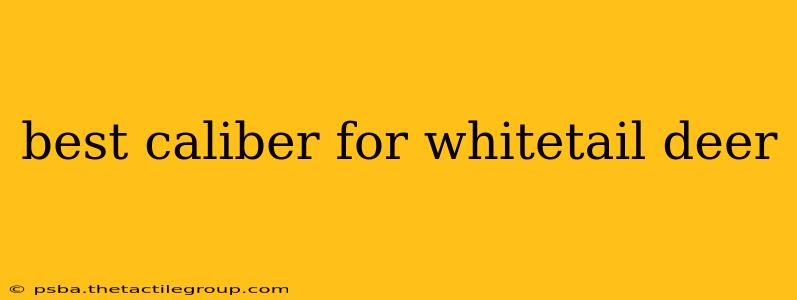Choosing the right caliber for whitetail deer hunting is crucial for a clean, ethical kill and a successful hunt. This isn't a simple question with a single answer, as the ideal caliber depends on several factors, including shot distance, terrain, personal preference, and the specific hunting situation. This guide will explore various calibers, their pros and cons, and help you determine the best option for your needs.
Factors to Consider When Choosing a Caliber
Before diving into specific calibers, let's examine the key factors influencing your decision:
1. Shot Distance:
- Close-range shots (under 50 yards): A wide range of calibers will suffice. Even smaller calibers, with proper shot placement, can be effective.
- Medium-range shots (50-150 yards): You'll want a caliber with sufficient energy retention at longer ranges. Flatter-shooting cartridges become increasingly important.
- Long-range shots (over 150 yards): Accuracy and energy retention are paramount. This often necessitates higher-powered cartridges and superior marksmanship.
2. Terrain:
- Open fields: Longer-range shots are more common, demanding a flatter trajectory and powerful cartridge.
- Thick woods: Close-range shots are typical, allowing for a wider selection of calibers. However, bullet penetration is still important due to potential for brush deflection.
3. Personal Preference & Experience:
- Recoil sensitivity: Larger calibers produce more recoil. Hunters sensitive to recoil might prefer lighter calibers.
- Shooting experience: Beginners might benefit from lighter recoiling calibers to improve accuracy and build confidence.
- Cost of ammunition: Ammunition costs can vary significantly between calibers.
4. Ethical Hunting Practices:
The most important factor is ethical hunting. Choosing a caliber that ensures a quick, humane kill, minimizing suffering, is paramount. This emphasizes proper shot placement above all else.
Popular Calibers for Whitetail Deer
Several calibers are popular and effective for whitetail hunting:
.243 Winchester:
- Pros: Low recoil, relatively flat trajectory, good accuracy, affordable ammunition.
- Cons: Less powerful than larger calibers, may be less effective on larger bucks at longer ranges. Suitable for younger hunters or those sensitive to recoil.
.270 Winchester:
- Pros: Excellent balance of power, accuracy, and manageable recoil. Effective at longer ranges. A versatile and popular choice.
- Cons: More recoil than .243 Winchester.
.30-06 Springfield:
- Pros: Powerful, accurate, long-range capability, widely available ammunition. A classic choice for many hunters.
- Cons: Significant recoil, can be overkill for close-range shots.
.308 Winchester:
- Pros: Powerful, accurate, manageable recoil compared to .30-06, widely available ammunition. A good all-around choice.
- Cons: May not be as effective at extreme ranges as the .30-06.
7mm-08 Remington:
- Pros: Excellent balance of power, accuracy, and manageable recoil. A great option for those who want the power of a .30-06 without the heavy recoil.
- Cons: Ammunition may not be as widely available as other calibers.
6.5 Creedmoor:
- Pros: Excellent long-range accuracy, relatively low recoil, good energy retention. Increasingly popular for its performance.
- Cons: May require more precise shot placement than larger calibers.
Choosing the Right Caliber for You
The "best" caliber for whitetail deer is subjective and depends on your individual needs and hunting circumstances. Consider the factors discussed above and carefully weigh the pros and cons of each caliber before making your decision. Seek advice from experienced hunters and consult ballistic charts to understand the performance characteristics of different cartridges. Remember, ethical hunting practices and proper shot placement are paramount regardless of the caliber you choose. Always prioritize a clean, humane kill.

